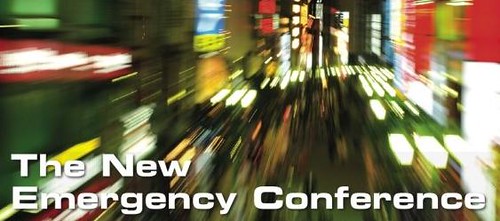 FEASTA, the Foundation for the Economics of Sustainability, have been ringing the alarm bell on Peak Oil for many years. With conferences such as “What will we eat when the oil runs out” and “Peak Oil: The End of Economic Growth?” they have never shied away from exposing the worst case scenarios and asking the really difficult questions. Whilst the speakers at the recent “Green New Deal” lecture spoke about restarting the economy on a green footing and that we have the technology to move to a “ZeroCarbonIreland”, FEASTA member David Korowicz’s comment was that it was too little, too late. The triple crunch of peak oil, climate instability and financial collapse has arrived. His view is that we will shortly be facing a national emergency and we need to get ready. Hence the title of their forthcoming conference – “The New Emergency“. Details below the fold.
FEASTA, the Foundation for the Economics of Sustainability, have been ringing the alarm bell on Peak Oil for many years. With conferences such as “What will we eat when the oil runs out” and “Peak Oil: The End of Economic Growth?” they have never shied away from exposing the worst case scenarios and asking the really difficult questions. Whilst the speakers at the recent “Green New Deal” lecture spoke about restarting the economy on a green footing and that we have the technology to move to a “ZeroCarbonIreland”, FEASTA member David Korowicz’s comment was that it was too little, too late. The triple crunch of peak oil, climate instability and financial collapse has arrived. His view is that we will shortly be facing a national emergency and we need to get ready. Hence the title of their forthcoming conference – “The New Emergency“. Details below the fold.
The New Emergency
All Hallows College, Dublin 10th-12th June 2009
Almost 70 years ago, the outbreak of World War II forced the Irish Government to declare a state of national emergency. The Emergency Powers Act of September 1939 gave it the authority “to make provisions for the maintenance of public order and for the provision and control of supplies and services essential to the life of the community.” Today a similar attitude is needed to address an emergency of a different and even more compelling kind: global economic collapse, combined with crises in climate change, water and energy supply, soil erosion, and the massive over-exploitation of natural resources. The extraordinary growth in population, wealth, urbanisation and societal complexity witnessed since the Industrial Revolution cannot continue. Nature’s life-support systems are failing fast. Humanity is facing what might be called “The New Emergency.” If ours is to be a stable world, the restoration of resilience at a local and global level must become a priority. And this resilience has to be achieved with the commitment and pace that countries adopt when, as in 1939, there is an immediate and very real threat to people’s security and well-being.
This conference, marking Feasta’s tenth anniversary, will analyse the systems and the mindsets that have steered the world onto its grotesquely unsustainable current path. Discussions will focus on the new systems (financial, energy, food) and ways of thinking that are urgently required to correct the situation and bring about a rapid transition to a more secure future. Many of the ideas explored are Feasta’s. Others will be presented by international speakers who broadly share Feasta’s analysis of what needs to be done to build a truly sustainable world.
Speakers include:
- Dmitry Orlov, author of Reinventing Collapse, gives a public lecture at the Davenport Hotel, June 9th and features throughout the conference with a focus on deglobalisation, relocalisation and definancialisation.
- Richard Douthwaite, Feasta co-founder and author of The Growth Illusion, Short Circuit and The Ecology of Money, explains how the primary global crises interrelate and are intrinsic to our economic and governance structure
- Julian Darley, author of High Noon for Natural Gas, examines the factors involved in high-level decision making for sustainable change.
- David Korowicz, Physicist and Feasta executive, gives a systems view of collapse dynamics
- Dan Sullivan, director of Saving Communities, investigates land value taxation as a community development tool.
- Ludwig Schuster, Living City Architects, concentrates on bio-regional currencies that encourage sustainable use of resources rather than requiring growth and exploitation.
- Bruce Darrell, co-founder of Dublin Food Growing and Feasta executive, explores methods to develop secure food systems that do not rely on finite resources.
Conference Fees for the three day event including public lecture
Full rate €420 Feasta Members/NGOs €280
For more information contact Kathryn Speedie at conference[at]feasta[dot]org
For media requests call Kathryn on #01 6638200
